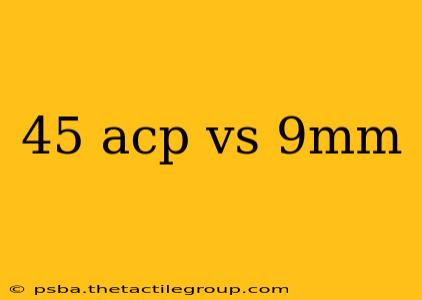Choosing the right caliber for self-defense or target shooting can feel overwhelming. Two popular choices often top the list: the venerable .45 ACP and the ubiquitous 9mm. This in-depth comparison will delve into the key differences between these cartridges, helping you make an informed decision based on your specific needs and preferences.
Ballistics: Power vs. Capacity
The most significant difference between .45 ACP and 9mm lies in their ballistics. The .45 ACP boasts a significantly larger diameter bullet (0.452 inches) and generally carries more weight, resulting in greater stopping power due to its heavier impact. This translates to a larger wound cavity upon impact, potentially leading to quicker incapacitation of a target. However, this advantage comes at a cost: lower magazine capacity. Typical .45 ACP magazines hold 7-10 rounds, compared to the 15-17 rounds often found in 9mm magazines.
Key Ballistic Differences Summarized:
| Feature | .45 ACP | 9mm |
|---|---|---|
| Bullet Diameter | 0.452 inches | 0.355 inches |
| Muzzle Energy | Higher (generally) | Lower (generally) |
| Stopping Power | Generally perceived as higher | Generally perceived as lower |
| Magazine Capacity | Lower | Higher |
| Recoil | Higher | Lower |
Recoil and Shootability
The increased mass and energy of the .45 ACP round translates to significantly more recoil. This can be a challenge for new shooters or those with less upper body strength, potentially impacting accuracy and follow-up shots. The 9mm, with its lower recoil, is generally considered easier to shoot quickly and accurately, allowing for faster target acquisition and more shots on target in a self-defense scenario.
Cost and Availability
Both calibers are readily available, but the 9mm generally offers better value. Ammunition for the 9mm is typically less expensive than .45 ACP, making it a more cost-effective option for regular practice and training. The wider availability of 9mm handguns also contributes to its affordability.
Accuracy and Range
While the .45 ACP is capable of accurate shooting, the lower recoil of the 9mm often allows for improved accuracy, particularly at longer ranges. The 9mm's flatter trajectory also contributes to its accuracy at longer distances. However, for close-range self-defense situations, the difference in accuracy is often negligible.
Choosing the Right Caliber: Considerations for Self-Defense
The "best" caliber ultimately depends on individual factors.
-
Experience: Novice shooters often benefit from the lower recoil of the 9mm, facilitating better accuracy and control under stress.
-
Physical Strength: Individuals with less upper body strength may find the .45 ACP's recoil difficult to manage.
-
Training: Proper training is crucial regardless of the caliber chosen. The ability to accurately place shots is more important than the caliber itself.
-
Intended Use: For concealed carry, the higher capacity of the 9mm may be advantageous. For home defense, where distance is often shorter, the stopping power of the .45 ACP could be a priority.
Conclusion: A Matter of Personal Preference and Needs
The .45 ACP and 9mm represent two excellent choices for self-defense and recreational shooting. The .45 ACP provides greater stopping power but with increased recoil and lower capacity. The 9mm offers higher capacity, less recoil, and greater affordability, potentially leading to improved accuracy and faster follow-up shots. Ultimately, the best choice depends on individual needs, preferences, and training. Consider your experience level, physical capabilities, and intended use case before making a decision. Consult with experienced shooters and firearms instructors to gain further insights and make an informed choice.

